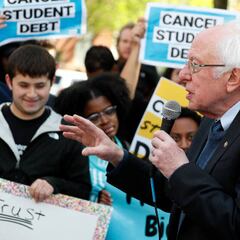What are the negatives of student loan forgiveness?
President Biden is thought to be considering writing off a proportion of student loan debts for borrowers, but would the huge outlay be worth it?


In April President Biden signed an extension to the student loan moratorium which has been in place since the start of the pandemic.
Borrowers will not be required to resume payments, and will not be subject to any interest accruing, until 31 August at the earliest. This provides more short-term relief for the 43 million Americans currently burdened by federal student loans, but many in Congress want the White House to push for student loan forgiveness.
Scoop: White House *looking* at $10K or more of per-borrower debt forgiveness for earners under $125-150K single/$250-300K couples prior year, per sources
— Jeff Stein (@JStein_WaPo) April 30, 2022
Overwhelming majority would qualify
***No final decision on amount canceled or means test***https://t.co/6fdBSOg8jB
Earlier this week it was reported that President Biden was “positive” on the prospect of writing up $10,000 of student loan debt per person, a measure which should help to address the wealth gap in the United States.
However there are undoubtedly some potential drawbacks to the proposals…
Widespread forgiveness could fuel inflation
Currently around 13% of Americans have student loan debts, but one issue affecting the vast majority of Americans is the high rate of inflation. The financial stimulus poured into the economy through the first 18 months of the pandemic was designed to provide additional impetus, but the measures may have gone too far.
The influx of federal dollars into the economy boosted consumers’ spending power and served to push up prices across the board. As the economy has returned to normal the consequence of that investment has been a continued rise in prices, which is actually hurting consumers in real terms. There is concern that more financial relief, this time in the form of student loan forgiveness, could exacerbate the issue.
Is student debt forgiveness the best use of the funds?
While supporters of student loan forgiveness claim that it would remove the burden on low-income households, for many people who attend college the investment is more than worth the expense.
Neal McCluskey, the director of Cato’s Center for Educational Freedom, points out: “In 2019, the average graduate of a four-year, non-profit college who took on loans left school with only about $29,000 in debt” while “the average four-year degree holder makes six to seven figures more during their life than someone” who did not attend higher adduction.
With this in mind some have argued that widespread student debt forgiveness is not necessary because graduates often make enough money during their life to repay the debt many times over.
Our challenges are all connected.
— Rep. Val Demings (@RepValDemings) April 25, 2022
Medical debt.
Student loans.
Record low wages.
Rising inflation.
Reducing financial burdens like these will help millions of Americans qualify for mortgage loans. #FairHousingMonth
Why should student loan borrowers be prioritised?
Related stories
Detractors from the student loan forgiveness proposals often claim that writing off such a significant amount of debt is unfair on those who have already paid off the money they borrowed.
Some Republican lawmakers have also suggested that focusing on student debt, rather than mortgages and credit cards, for example, unfairly prioritises certain borrowers. At a time when households across the country are struggling to make ends meet, spending such a huge amount on student loan forgiveness could alienate key voter groups.

